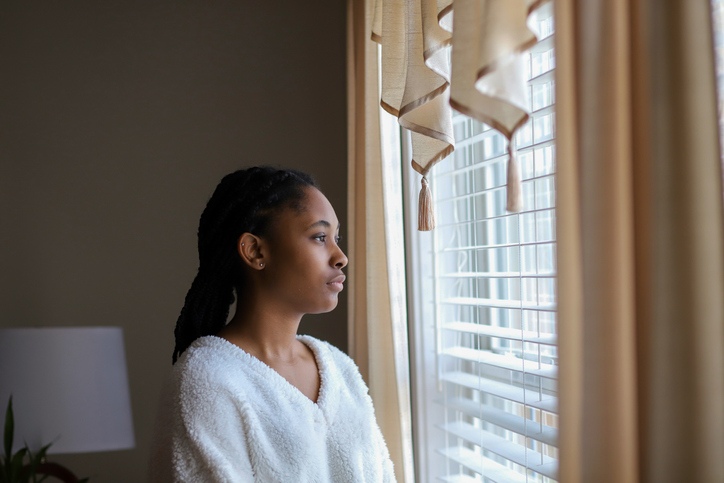
Source: Robin Gentry / EyeEm / Getty
Reports from around the world have shown that there has been an increase in instances of domestic violence since the coronavirus has sequestered many of us to our homes. And with the increased time at home, with partners and children, people are in abusive relationships are under particular duress.
Recently, we spoke with Maribel Martinez-Gunter, Director of the Family Law and Immigration Unit at Manhattan Legal Services about the spike in domestic violence cases, what victims can do to protect themselves during this time and how race and socioeconomic factors make us experience the effects of this virus differently.
Since we’ve been social distancing, quarantining due to coronavirus, people have reported, across several nations, that the incidents of domestic violence have increased. Have you seen that as far as New York City goes?
Yes, there have been several discussions with advocates all across New York City. We are hearing things anecdotally. Some of the things we’re hearing from the clients we’re currently serving. We’ve also certainly heard that there have been greater searches for things related to domestic violence and resources. It’s a bit of a quandary in that I think folks are looking for resources but at the same time, I think there is a dip in actual calls or cases that are actually coming in. I think that that’s typical. I think we won’t understand the full breadth of it until once this is over. And there are many individuals that really don’t have a lot of options and choices available to them. They might be living in the same household with an abusive partner and the courts are virtually open but that does mean they would need to be on a phone call or a video. That might not be possible to do that if the abusive partner is still living in the home.
We’re in an economic crunch. So there are individuals who may want safety but there are also economic ties to the abuser. Children have always been a factor. If they’re not being home-schooled. All of those different issues will weigh on an individual contemplating if now is the right time to end a relationship. Victims of domestic violence are experts as to when is the right time because at that moment of departure is when there is a greater chance that the violence will escalate. There’s a greater chance for fatalities. We are certainly not encouraging people to leave until they feel that they are ready and able to leave because there’s heightened danger in leaving.
The folks we’ve been working with are calling with concerns about visitation orders that may have been entered into temporarily or as a final order when the other partner is abusive, when the child is asthmatic, when the other partner might be immunocompromised themselves. And they’re concerned about releasing their child to go off on a visit. We’re telling people to social distance but the children are still navigating multiple households because of these visitation orders. Those are some of those concerns about negotiating that when someone has a history of abusing them. This is perfect storm for there to be future incidents of coercive control and more control occurring.
A lot of times when we hear about domestic violence victims, the advice people give is “just leave” We know that’s very dangerous thing to do without a plan. What do you say to people who are in a violent situation and want to get out but don’t want to do so in a manner that will further threaten their safety, especially now when that might be virtually impossible?
Safety planning is the key. And everyone’s safety plan is going to look different. It’s not a cookie cutter solution. Not everything works for everyone. Some people may opt and say, ‘Well, I think I’ll be safer for the time being remaining in the home with an abuser.’ So those are very real conversations that you need to have with an individual who thinks that’s the safest bet for them.
You have to start identifying:
What have been the triggers in the past toward episodes?
Those will very likely be the sign posts that will tell us that a future incident is coming our way. So if it’s like every Friday, my partner drinks and then this happens. We need to think what are we going to do this Friday. We need to think about the types of conversations that tend to trigger explosive incidents. Very likely they may be about economic factors, the children, sex and sexual coercion. We need to think about when these kinds of things are happening, you’re not going to be able to run in the bathroom. A bathroom is a very dangerous place when you’re in a home with an abuser because usually there’s only one way in and that’s the same way out.
You need to find an open space in the home so if you need to run out, you’d be able to do that.
Think about organizing all your important papers.
Birth certificates, social security cards, passports, really important papers that would be difficult for you to get a new certified copy of it if you had to. Start putting them in a safe place.
Is it possible to put away some money?
Can you create excuses as to why you might need to be out of the home?
Do you trust your neighbors?
Is there someone within close proximity that you feel you can call upon? If they hear something does your neighbor know they can call—if it’s not 9-1-1, call my relative if you hear something going on. Is there a person in your neighborhood who would be accepting to you? Is there a bodega or grocery store? Is there a fire department in your neighborhood? What’s in the area?
Are you going to need to take the technology too?
Kids are doing school by technology so are you going to be able to take that with you? Are you going to be able to maneuver with all of that? Those are things that can be replaced, obviously, but those are also things that take time to replace.
The more things that someone who’s already feeling victimized, dejected, who probably—if they did need to run will probably feel like, ‘Did I make the right choice?’ As much as familiarity as they can have with their own things, as much as they can hold on to their stuff, that’s going to be helpful.
We would work out a very detailed safety plan. If [staying] is the safest place for me to be now, how can I keep myself as safe as possible for as long as possible? And those safety plans need to be revisited. It’s not something that will work forever. It’s something that needs to be flexible and be able to change.

Which factors contribute to domestic violence and which of these might be exacerbated by coronavirus and spending so much more time at home.
There is a spike in domestic violence during natural disasters. There were things like that during Katrina and other hurricanes. Domestic violence is exacerbated by other economic factors. There are studies that show that. You now have a situation where some people may be out of work or may not be able to work at full capacity. That is going to create a huge financial stressor for people. That will trigger into stressors for a household, inevitably. Families that have healthy communication and equal bargaining power will be able to meet that stressor together. We do expect that kind of economic stressor will provoke domestic violence. I do expect that it will provoke child abuse as well.
The children being at home is another significant stressor. Children are being home-schooled and that takes a significant amount of effort because parents are expected to take on the role of being a teacher or at least a tutor. There may be a technology gap between the child and the parent. Certainly the way that kids are doing math now does not mirror the way that other generations did math. It will exacerbate the fact that some of the parents may not be able to do some of the work that the children are assigned and that will create stress. Some children have (IEPs) individualized education plans because they need special services and they may not be able to have them. Some children might be hyperactive. If a child needs a lot of exercise and movement so they can focus, that’s going to be hard if they’re under a shelter in place order.
Some families don’t have their own apartment, they’re renting out rooms. Those are very close quarters.
Sexual coercion is a big part of domestic violence. New York City has deemed liquor shops to be an essential service. People are still able to buy alcohol which might be good or might be bad depending on your situation. But we know that if people are home and feeling depressed, feeling anxious, they might decide to drink more.
Even though couples may both be at home, generally the mom is expected to care for the children, do the house cleaning. Those are a lot of stressors to have now. Houses need to be sanitized. That could be an issue.
COVID-19 lands on people differently. I heard someone say, for some people it’s a sprinkle, for other’s it’s a storm and for others, it’s a hurricane. Depending on what your situation is, what your home environment is, what your economic situation is, what the division of home labor might look like. It’s going to land on you very differently. And for victims of domestic violence, we expect that it lands on them the hardest.
I can’t imagine how many clients I have who are thinking, ‘I should just stay here and put up with the marital rape.’ Or ‘I should put up with the push, the shove, the kick, the smack because at least I have a home. At least I’m not out on the street.’
We know that although there are domestic violence shelters. There aren’t enough. Before COVID, every ten callers, one family got in. If there weren’t enough then, there certainly aren’t enough now when people are expected to be social distancing.
Those are hard choices that people have to make. And women who tend to be the victims of domestic violence—not always men can be victims too—but of those reported cases, women tend to be the majority, women will often sacrifice themselves for the betterment of the family. And that sacrifice means enduring this kind of victimization because they feel their family will be better off being intact, being at home than being separated. And I don’t think we’re going to hear the brunt of it until the storm passes.
I was thinking there are going to be a lot of people who are experiencing violence or abusive behavior for the first time because they’re spending so much time with partners, maybe new, and I can see a lot of people excusing the abuse because we’re under all this stress and pressure right now. So what would you say to people, women specifically (because this is a women’s site), who would feel the need to make an excuse for the abusive behavior they experience during this time?
I’d say resist the urge to make that excuse. One thing that I know for sure is that victims of domestic violence protect that perpetrator far more than that perpetrator will ever consider protecting the victim. That plays out over and over again. It’s easy to excuse someone and say, ‘Well it was the alcohol. It’s because they’re unemployed. It’s because they’re under pressure. It’s because the kids are too loud. It’s because the dinner burned.’ Women have been making those excuses for generations. What I know is that when people are under pressure it brings out what was already in there. When you’re squeezed, what comes out is what’s been at the core but you’ve been able to mask it and you’ve been able to hide it more effectively when you’re not under pressure.
It’s very rare that someone leaves a relationship after that first unveiling of abuse. It’s great for those who can. But that’s unusual. It’s much more common for people to rationalize it. And then maybe something of a different nature happens and then they kind of don’t see the connection. And it’s not until they have a real chance to step away and see how all of the dots connected. Because abuse is going to look different in different situations, even in one relationship. Abusers have many tools available to them. But it’s ultimately about coercive control, what we call power control. And Power Control can happen by pleasure and it can happen by pressure. Some abusers will give gift and obtain control. And others will be violent to gain control. But if a person has an intent to have their way, regardless of what your wishes, intentions and desires are, they’re going to use all types of different tactics. And they’re going to start with an emotional tactic.
It’s very rare for something to start off as a hit, a push, a shove. Usually way before that happens, there’s been some emotional manipulation, psychological manipulation to get a person ready to receive that next part.
I read a New York Times article that said that a lot of governments across the world were just thinking about protecting people from the virus so they weren’t anticipating the type of social problems people would encounter being at home. They didn’t consider expanding shelters, make more DV hotlines. So what are some that the government can do to protect people who find themselves in an abusive relationship?
Well that’s a hard call because the government’s primary focus right now is the healthcare field. But the social considerations are the storm within the storm. So definitely attention needs to be placed in terms of—I would look at the economic issues because those are the issues that lead to more violence in a home or two, is the impetus as to why victims might opt to stay in a dangerous situation.
So to the extent that we can get money and resources into the hands of people that need it, that will be huge. The government talks about a stimulus check but that’s not going to go to everyone that needs it. It’s certainly not going to go to folks that are undocumented. It is not going to go to people who make over a certain income and domestic violence happens across economic groups.
To the extent that we can address food shortages, that would be huge in terms of helping folks to cope with the stress and helping people with the space to think about options.
Obviously, if we could make more domestic violence shelter beds that would be good but that is usually not something that can be done from one moment to the other. The shelters are usually run by the city or usually nonprofits. That takes time and planning to have those things in place. They have security, case managers and employees. So it’s not something you can do at a drop of a dime. But now that COVID is going to be in our lives for the foreseeable future until there is a cure or vaccine, it’s something we need to start thinking about, how to address some of these social issues that are accompanying the healthcare crisis.
There’s a racial disparity that goes along with COVID. The communities that were affected by racism, classism, all the isms before COVID are experiencing COVID in a very different way. Some communities in New York City and it’s like COVID is not happening. And then in low income communities, there are people wearing masks and gloves, it’s like a Tale of Two Cities is still happening. Race and socioeconomic status factor into outcome for this disease as well.









